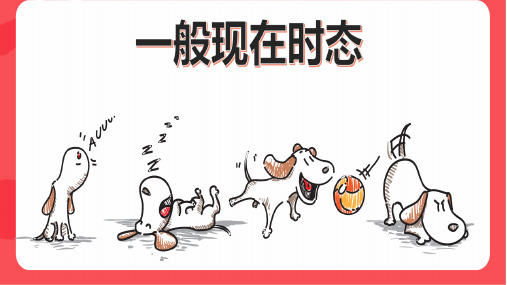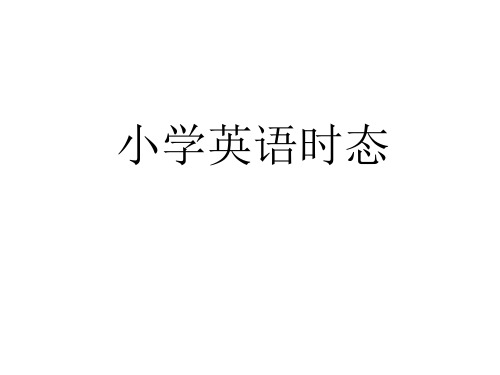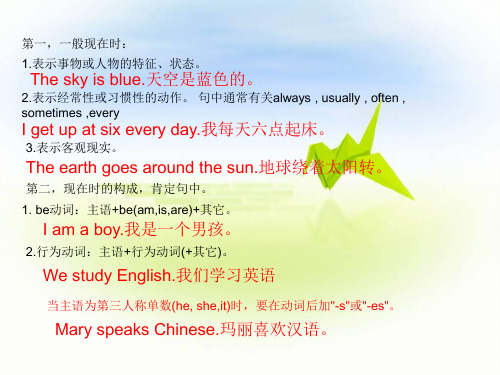小学英语一般现在时ppt课件
合集下载
小学六年级英语语法复习ppt课件

小学六年级英语
.
.
.
.
• 写出下列各词的复数 I _________him _________this ___________her ______ watch _______child _______photo ________diary ______
man______ woman_______ paper_______ juice___________ water________ milk________ rice__________ tea__________
.
• 2.行为动词:主语+行为动词(+其它)。如: We study English.我们学习英语。 当主语为第三人称单数(he, she,it)
时,要在动词后加"-s"或"-es"。如: Mary likes Chinese.玛丽喜欢汉语。
.
• 二、用括号内动词的适当形式填空。 1. He often ________(have) dinner at home. 2. Daniel and Tommy _______(be) in Class One. 3. We _______(not watch) TV on Monday. 4. Nick _______(not go) to the zoo on Sunday. 5. ______ they ________(like) the World Cup?
• 6, 用在序数词,方位词前和形容词最高级前, the first , the east, the tallest
.
• 3、零冠词(不用定冠词) (1)名词前已有作定语用的this, that, these, those, my, your, his, her, our, their, some等限 定词时,不用冠词。如:this eraser, her pencilbox, some boxes, those women等。 (2)泛指的不可数名词前一般不用冠词。如:meat, rice, water, bread, tea, milk, juice等。 (3)复数名词表示泛指时,不用冠词。如: the people in the room are doctors. 房间里的那 些人是医生。 (4)在表示学科的名词前一般不用冠词。如: Chinese, English, math, physics, history等。在 三餐饭和球类运动名词前一般不加冠词。如:have breakfast/ lunch/ supper, play basketball/ football等。 (5)在季节、节日、星期、月份前不用冠词。如: autumn, summer, winter, spring, Teachers’ day, Children’s day, Sunday, February等。 (6)在表颜色、语种和国家名词前不用冠词。如: white, brown, French, Australia等。 (7)在表示称呼语的名词之前,以及职务、头衔的 名词前不用冠词。如:Docto.r green is a scientist. 格林博士是位科学家。
.
.
.
.
• 写出下列各词的复数 I _________him _________this ___________her ______ watch _______child _______photo ________diary ______
man______ woman_______ paper_______ juice___________ water________ milk________ rice__________ tea__________
.
• 2.行为动词:主语+行为动词(+其它)。如: We study English.我们学习英语。 当主语为第三人称单数(he, she,it)
时,要在动词后加"-s"或"-es"。如: Mary likes Chinese.玛丽喜欢汉语。
.
• 二、用括号内动词的适当形式填空。 1. He often ________(have) dinner at home. 2. Daniel and Tommy _______(be) in Class One. 3. We _______(not watch) TV on Monday. 4. Nick _______(not go) to the zoo on Sunday. 5. ______ they ________(like) the World Cup?
• 6, 用在序数词,方位词前和形容词最高级前, the first , the east, the tallest
.
• 3、零冠词(不用定冠词) (1)名词前已有作定语用的this, that, these, those, my, your, his, her, our, their, some等限 定词时,不用冠词。如:this eraser, her pencilbox, some boxes, those women等。 (2)泛指的不可数名词前一般不用冠词。如:meat, rice, water, bread, tea, milk, juice等。 (3)复数名词表示泛指时,不用冠词。如: the people in the room are doctors. 房间里的那 些人是医生。 (4)在表示学科的名词前一般不用冠词。如: Chinese, English, math, physics, history等。在 三餐饭和球类运动名词前一般不加冠词。如:have breakfast/ lunch/ supper, play basketball/ football等。 (5)在季节、节日、星期、月份前不用冠词。如: autumn, summer, winter, spring, Teachers’ day, Children’s day, Sunday, February等。 (6)在表颜色、语种和国家名词前不用冠词。如: white, brown, French, Australia等。 (7)在表示称呼语的名词之前,以及职务、头衔的 名词前不用冠词。如:Docto.r green is a scientist. 格林博士是位科学家。
小学英语一般现在时 第三人称单数 动词三单变化规则课件ppt

动词的三单变化
1、She studies English well. 2、Mike flies a kite. 3、Lucy play games every day. 4、The girl carries the box.
动词的三单变化 4、特殊变化
have — has go — goes do — does
单项选择
1.Ben_____a new bicycle. A.have B.has C.are D.were 2.Kitty_____her bicycle to the park. A.ride B.riding C.rides D.ridden 3.A man _____in front of his car. A.walk B.walks C.walking D.work 4.Sam’s bicycle ______a bell. A.have B has C.having D.is having 5.The girl _______ “Excuse me” A.say B.saying C.says D.sayes
单项选择
6.Mike______not like his bike. A.do B.is C.does D.are 7.He ______apples. A.likes B.like C.does D.are 8.He_______with his nose. A.smelling B.smells C.smell D.is smell 9.Lucy_______with her hands. A.touch B.touching C.touches D.touchs
studies finishes has lunch runs buys
综合练习
一般现在时全讲PPT课件 小学英语 初一英语

every day every week every month
every year every morning /afternoon /evening
Every
day week month year morning afternoon早上 每天
每月 每天下午
回答:Yes, he is. No, he isn't.
Be提前,小变大,句变问,有 我就变你。 你问我答。
【一般现在时构成】
Do 型句
e.g. These boys like playing football. Lucy reads English every day.
动词是实义动词 构成: 主语+ 实义动词+ 其他
【一般现在时构成】
Do 型句
e.g. These boys like playing football. Lucy reads English every day.
当主语是第三人称单数的时候, 动词就要变成对应的第三人称单数。
人称与实义动词形式变化
当主语是第三人称单数的时候, 动词就要变成对应的第三人称单数。
快来总结定义啦! !
表 示 人 或 物 _ 习 __惯__性__,经___常__性___的动 作
表示人或物__现__在_____的状态 表示客观_事实 _或普遍_真___理___
一般现在时的“标志词”
大家好 , 我是Every俱乐部的 会长 ,右面都是我们的成员 。 我们和“一般现在时”认识好久 了 ,我们一直形影不离。
never
usually sometimes hardly
频率家族七兄弟
always usually often sometimes rarely hardly never
人教版(PEP)小学英语五年级上册期末复习课件ppt---一般现在时(共42张PPT)

重点
有be用___b__e___,有情用 __情_____,无be无情请求 __助________ (___d__o___、 __d__o_e_s__) 。
时态句式
肯定句
否定句 疑问句
not “不”
一般疑问句 特殊疑问句
Yes,… No,…
特殊疑问词提问 What,Where…
Bonus time
放在be动词的__后_面___
notes
常见结构
I like sleeping very much. 1. 非第三人称单数主语+__V_原____
注意:常见的非第三人称单数主语有:
__I____,__w_e___,_y__o_u__,_t_h_e_y__, my friends,the farmers…
Make sentence
they usually
the students every day
常见结构
He makes a card after class. 2. 第三人称单数主语+_V__-_s_/_V_-__e_s (动词
_第__三__人___称__单__数______形式)
注意:常见的第三人称单数主语有:
无be无情请求助(do, does)
He reads books every day. 否定句:He __d_o_e_sn_’_t __r_e_a_d__ books every day. 一般疑问句: __D_o_e_s ___h_e_ _r_e_a_d__ books every day? 肯否回答: Yes, he does./ No, he doesn’t. 特殊疑问句: ____W__h_a_t ___d_oe_s___he _d_o___ every day?
小学英语时态-PPT

一般现在时
(2) 当句子中即没有be动词,也没有情态动词时 ①陈述句:We get up at 7:00 every morning. 疑问句→Do you get up at 7:00 every morning? 否定句→We don’t get up at 7:00 every morning. ②陈述句:She has a little brother. 疑问句→ Does she have a little brother? 否定句→ She doesn’t have a little brother.
现在进行时
1. The boy is playing basketball. 否定句:____________________________ 一般疑问句:_________________________ 肯定回答:__________________________ 否定回答:__________________________
12. We _________ (not watch) TV on Monday.
13. Nick_______ (not go) to the zoo on Sunday.
14. They _________ (like) the World Cup?
按要求完成句子
1.Do you often play football after school? (肯 定回答) 2. I have many books. (改为否定句) 3. Gao Shan’s sister likes playing table tennis (改为否定句) 4. She lives in a small town near New York. (改为一般疑问句) 5. I watch TV every day. (改为一般疑问句) 6. David has got a goal. (改为一般疑问句)
一般现在时之一、二人称以及复数 (小学英语语法精品课件)

KOKO与你学英语之
一般现在时
第一、二人称以及复数
教学目标:
通过生动有趣的故事,让学生深刻理解一般 现在时的含义以及第一人称I、第二人称you 和复数形式下的一般现在时的be动词和实意 动词的变化形式。
新知
Today, our story is the Sun and the Wind.
新知
I am the Wind. I am always the best !
3 简单现在时表示客观的事实或者真理。
4 简单现在时中,第一人称(I)、第二人称 (you )和复数名词后面的动词不用变化。 。
5 一般现在时中,当主语是第一人称I时,be动词 直接变成am 。当主语是第二人称you或者复数 时,be动词变为are。
Thank you
新知
Sun, you are the best. Now, we are good friends.
一般现在时中,当主语是第二人称you或者复数时,be 动词变为are.
小结
补充
1 简单现在时表示现在发生的动作或存在的状 态。 2 简单现在时表示经常或者习惯性动作。经常和 频率副词every day, often , usually 等词连用。
一般现在时表示经常性或者习惯性动作。在一般现在时 中,当主语是第一人称I时,be动词直接变成am 。 Nhomakorabea新知
I am the Sun. I am the best !
一般现在时表示客观真理或者事实。一般现在时中,当 主语是第一人称I时,be动词直接变成am 。
新知
Do you see the man? I want to take off his coat. Let’s make a bet.
一般现在时
第一、二人称以及复数
教学目标:
通过生动有趣的故事,让学生深刻理解一般 现在时的含义以及第一人称I、第二人称you 和复数形式下的一般现在时的be动词和实意 动词的变化形式。
新知
Today, our story is the Sun and the Wind.
新知
I am the Wind. I am always the best !
3 简单现在时表示客观的事实或者真理。
4 简单现在时中,第一人称(I)、第二人称 (you )和复数名词后面的动词不用变化。 。
5 一般现在时中,当主语是第一人称I时,be动词 直接变成am 。当主语是第二人称you或者复数 时,be动词变为are。
Thank you
新知
Sun, you are the best. Now, we are good friends.
一般现在时中,当主语是第二人称you或者复数时,be 动词变为are.
小结
补充
1 简单现在时表示现在发生的动作或存在的状 态。 2 简单现在时表示经常或者习惯性动作。经常和 频率副词every day, often , usually 等词连用。
一般现在时表示经常性或者习惯性动作。在一般现在时 中,当主语是第一人称I时,be动词直接变成am 。 Nhomakorabea新知
I am the Sun. I am the best !
一般现在时表示客观真理或者事实。一般现在时中,当 主语是第一人称I时,be动词直接变成am 。
新知
Do you see the man? I want to take off his coat. Let’s make a bet.
小学一般现在时-实义动词ppt课件

(2)结尾是s, x, sh, ch, o,前为辅音字母,
watches teaches goes does washes brushes
(3)动词末尾y前为辅音:将y改为i加es: study→studБайду номын сангаасes fly→flies carry→carries cry→cries
但在y前如果为元音则直接加s buys says
Mary speaks Chinese.玛丽喜欢汉语。
1. be动词的变化。
否定句:主语+ be + not +其它。 如:He is not a worker.他不是工人。
一般疑问句:Be +主语+其它。 如:
-Are you a student
-Yes. I am. / No, I'm not.
二、变一般疑问句并作肯定和否定 回答。
• 1.He wants a book. • 2. Jimmy washes hands before dinner. • 3. Lisa likes milk very much. • 4. They walk to school. • 5. Lingling and Dandan are 10 years old. • 6. I am Chinese. • 7. Ben is from America.
当主语为第三人称单数时,要用does构成一般疑 问句。如:
- Does she go to work by bike? - Yes, she does. / No, she doesn't.
三.第三人称单数的动词变化规则(只有在第 三人称为主语的肯定句中,动词才用三单式)
(1)多数动词直接加s: runs gets likes takes plays climbs
watches teaches goes does washes brushes
(3)动词末尾y前为辅音:将y改为i加es: study→studБайду номын сангаасes fly→flies carry→carries cry→cries
但在y前如果为元音则直接加s buys says
Mary speaks Chinese.玛丽喜欢汉语。
1. be动词的变化。
否定句:主语+ be + not +其它。 如:He is not a worker.他不是工人。
一般疑问句:Be +主语+其它。 如:
-Are you a student
-Yes. I am. / No, I'm not.
二、变一般疑问句并作肯定和否定 回答。
• 1.He wants a book. • 2. Jimmy washes hands before dinner. • 3. Lisa likes milk very much. • 4. They walk to school. • 5. Lingling and Dandan are 10 years old. • 6. I am Chinese. • 7. Ben is from America.
当主语为第三人称单数时,要用does构成一般疑 问句。如:
- Does she go to work by bike? - Yes, she does. / No, she doesn't.
三.第三人称单数的动词变化规则(只有在第 三人称为主语的肯定句中,动词才用三单式)
(1)多数动词直接加s: runs gets likes takes plays climbs
小学英语语法全套(课堂PPT)

strawberry _____
thief _____
you _____ peach___ sandwich ___
man_____ woman___
一般现在时
一般现在时基本用法介绍 一般现在时的功能 1.表示事物或人物的特征、状态。
如:The sky is blue.天空是蓝色的。 2.表示经常性或习惯性的动作。
如:I get up at six every day.我天天六 点起床。 3.表示客观现实。 如:The earth goes around the sun.地 球绕着太阳转。
一般现在时的构成 1. be动词:主语 be (am, is, are) 其它。 如:
I am a boy.我是一个男孩。
2.行为动词:主语 行为动词( 其它)。如: We study English.我们学习英语。 当主语为第三人称单数(he, she, it)时,
要在动词 后加“-s”或“-es” 如:Mary likes Chinese.玛丽喜欢汉语。
一般现在时的变化 1. be动词的变化。 否定句:主语 be not 其它。
❖2. I do my homework every day.(改为一般疑 问句,作否定回答) ______________________________________
Class One. 3. We _______(not watch) TV on
Monday.
4. Nick _______(not go) to the zoo on Sunday. 5. _____ they ______(like) the World Cup?
6. _______ your parents ______(read) news papers every day?
- 1、下载文档前请自行甄别文档内容的完整性,平台不提供额外的编辑、内容补充、找答案等附加服务。
- 2、"仅部分预览"的文档,不可在线预览部分如存在完整性等问题,可反馈申请退款(可完整预览的文档不适用该条件!)。
- 3、如文档侵犯您的权益,请联系客服反馈,我们会尽快为您处理(人工客服工作时间:9:00-18:30)。
It looks like a cat. 它看起来像只猫。
.
二、单个人名、地名或称呼作主 语;是第三人称单数。
①Han Mei looks like her mother. 韩梅看起来像她的母亲
②Beijing is in China. 北京在中国。 ③Uncle Wang often makes cakes.
.
一般现在时
(否定句)
句中没有be动词或情态动 词时,主语为第三人称单数的 否定句在动词前加does not (doesn’t),非单三时,否定 句在动词前加do not(don’例t如)
.
一般现在时 (否定句)
1、I go to school by bus. 否: I don’t go to school by bus. 2、He goes to school by bus. 否:He doesn’t go to school by bus.
.
变否定句
I want a banana. I don’t want a banana.
.
变否定句
She speaks English well. She doesn’t speak English well.
.
一般现在时 (疑问句)
句中有be动词或情态动词时,be 动词或情态动词can提前,首字母变 为大写;some 变any
The simple present tense 一般现在时
.
一般现在时表示经常发生的、习惯性的动作或存在 的状态。与频率副词usually ,often, sometimes ,always和时间短语in the morning /afternoon/evening, at noon/night , every day/week/year/month 连用 其构成为:
.
当主语是第三人称单数时,动词需变化. 动词单三的变化: 1、一般情况下,直接加s,如:
reads, plays, works, makes 2、以s, x, ch, sh结尾,后加es. 如:watches 3、以辅音字母加o结尾,一般加es ,如:does, goes 4、“元音字母+y”结尾的单词,直接在词尾加-s。
A.肯定句: 主语+动词(原形或第三人称单数)+其 他。
I study English every morning.
We speak Chinese.
Jim likes playing fo.otball.
一般现在时
一般现在时表示经常 或习惯性的动作,也可表 示现在的状态或主语具备 的性格和能力等。
王叔叔经常做蛋糕。
.
三、单数可数名词或"this / that / the+单数可数名词"作主语时,是第 三人称单数。
①A panda is a shy animal. 熊猫是害羞的动物。
②This book is yellow. 这本书是黄色的。 ③That car is red. 那辆小汽车是红色的。 ④The cat is black. 这只猫是黑色的。
(肯定句)
没有be动词和情态动词,主
语为第三人称单数的肯定句,动
词要按规则加上s或es,主语是 非第三人称单数的肯定句,动词 用原形。 例如
.
哪些主语是第三人称单数?
.
一、人称代词he, she, it是第三人称单 数。
He likes watching TV. 他喜欢看电视。 She has lunch at twelve. 她十二点吃午餐。
.
B. 否定句:主语+don’t/ doesn’t+动词原形 +其他。 I study English every morning. I don’t study English every morning.
We speak Chinese. We don’t speak Chinese.
Jim likes playing football. Jim doesn’t like playing football.
在一般现在时中,句 中有be动词或情态动词 (can等)时,否定句在 be动词和情态动词后加 not。 例如
.
一般现在时 (否定句)
1、I am a teacher.否:I am not a teacher. 2、He is a student.否: He is not a student. 3、You are a boy.否: You are not a boy. 4、I can swim.否: I can not(can’t) swim.
.
变否定句
I am a good boy. I am not a good boy.
.
变否定句
He is at school. He is not at school.
.
变否定句
They are students. They are not students.
.
变否定句
She can speak English. She can not speak English.
例如
.
ቤተ መጻሕፍቲ ባይዱ
一般现在时 (一般疑问句)
He is a student. You are a boy.
Is he a student? Are you a boy?
I can swim.
I am a teacher.
Can you swim? Am I a teacher?
.
变一般疑问句
Daming is my friend. Is Daming your friend?
.
一般现在时
(肯定句)
在一般现在时中,句 中有be动词或情态动词 (can等)时,be动词要 随主语而相应改变,情态 动词不变。 例如
.
一般现在时 (肯定句)
1、I am a teacher. 2、He is a student. 3、You are a boy. 4、I can swim.
.
一般现在时
如:plays, says 5、辅音字母+y结尾的单词,
去y,加ies, 如:worries, studies
.
一般现在时 (肯定句)
1、I go to school by bus. 2、He goes to school by bus. 3、She gets up at six.
.
一般现在时
(否定句)
.
二、单个人名、地名或称呼作主 语;是第三人称单数。
①Han Mei looks like her mother. 韩梅看起来像她的母亲
②Beijing is in China. 北京在中国。 ③Uncle Wang often makes cakes.
.
一般现在时
(否定句)
句中没有be动词或情态动 词时,主语为第三人称单数的 否定句在动词前加does not (doesn’t),非单三时,否定 句在动词前加do not(don’例t如)
.
一般现在时 (否定句)
1、I go to school by bus. 否: I don’t go to school by bus. 2、He goes to school by bus. 否:He doesn’t go to school by bus.
.
变否定句
I want a banana. I don’t want a banana.
.
变否定句
She speaks English well. She doesn’t speak English well.
.
一般现在时 (疑问句)
句中有be动词或情态动词时,be 动词或情态动词can提前,首字母变 为大写;some 变any
The simple present tense 一般现在时
.
一般现在时表示经常发生的、习惯性的动作或存在 的状态。与频率副词usually ,often, sometimes ,always和时间短语in the morning /afternoon/evening, at noon/night , every day/week/year/month 连用 其构成为:
.
当主语是第三人称单数时,动词需变化. 动词单三的变化: 1、一般情况下,直接加s,如:
reads, plays, works, makes 2、以s, x, ch, sh结尾,后加es. 如:watches 3、以辅音字母加o结尾,一般加es ,如:does, goes 4、“元音字母+y”结尾的单词,直接在词尾加-s。
A.肯定句: 主语+动词(原形或第三人称单数)+其 他。
I study English every morning.
We speak Chinese.
Jim likes playing fo.otball.
一般现在时
一般现在时表示经常 或习惯性的动作,也可表 示现在的状态或主语具备 的性格和能力等。
王叔叔经常做蛋糕。
.
三、单数可数名词或"this / that / the+单数可数名词"作主语时,是第 三人称单数。
①A panda is a shy animal. 熊猫是害羞的动物。
②This book is yellow. 这本书是黄色的。 ③That car is red. 那辆小汽车是红色的。 ④The cat is black. 这只猫是黑色的。
(肯定句)
没有be动词和情态动词,主
语为第三人称单数的肯定句,动
词要按规则加上s或es,主语是 非第三人称单数的肯定句,动词 用原形。 例如
.
哪些主语是第三人称单数?
.
一、人称代词he, she, it是第三人称单 数。
He likes watching TV. 他喜欢看电视。 She has lunch at twelve. 她十二点吃午餐。
.
B. 否定句:主语+don’t/ doesn’t+动词原形 +其他。 I study English every morning. I don’t study English every morning.
We speak Chinese. We don’t speak Chinese.
Jim likes playing football. Jim doesn’t like playing football.
在一般现在时中,句 中有be动词或情态动词 (can等)时,否定句在 be动词和情态动词后加 not。 例如
.
一般现在时 (否定句)
1、I am a teacher.否:I am not a teacher. 2、He is a student.否: He is not a student. 3、You are a boy.否: You are not a boy. 4、I can swim.否: I can not(can’t) swim.
.
变否定句
I am a good boy. I am not a good boy.
.
变否定句
He is at school. He is not at school.
.
变否定句
They are students. They are not students.
.
变否定句
She can speak English. She can not speak English.
例如
.
ቤተ መጻሕፍቲ ባይዱ
一般现在时 (一般疑问句)
He is a student. You are a boy.
Is he a student? Are you a boy?
I can swim.
I am a teacher.
Can you swim? Am I a teacher?
.
变一般疑问句
Daming is my friend. Is Daming your friend?
.
一般现在时
(肯定句)
在一般现在时中,句 中有be动词或情态动词 (can等)时,be动词要 随主语而相应改变,情态 动词不变。 例如
.
一般现在时 (肯定句)
1、I am a teacher. 2、He is a student. 3、You are a boy. 4、I can swim.
.
一般现在时
如:plays, says 5、辅音字母+y结尾的单词,
去y,加ies, 如:worries, studies
.
一般现在时 (肯定句)
1、I go to school by bus. 2、He goes to school by bus. 3、She gets up at six.
.
一般现在时
(否定句)
